
The Edge of dynamic learning
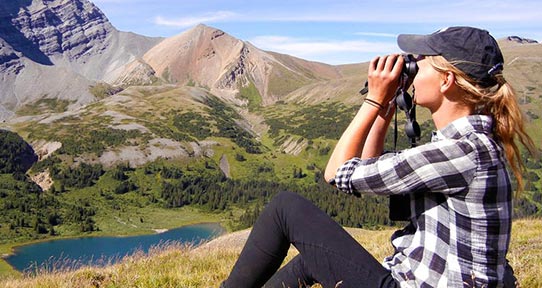
Biology student Brigitte Dreger-Smylie spent a co-op work term with Parks Canada, where she researched the effects of fire and forest thinning on grizzly bear habitat in Banff, Yoho and Kootenay National Parks. Photo: supplied by Dreger-Smylie.
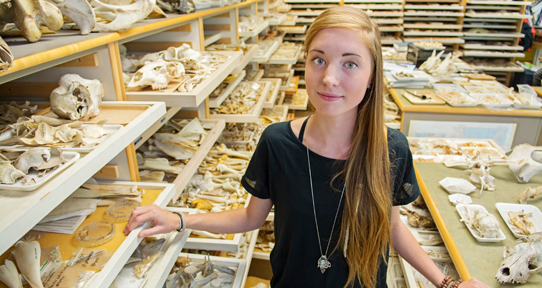
Undergraduate anthropology student Arielle Hofmeister-Bullick worked for a term in UVic's animal bone lab, learning from senior lab instructor Becky Wigen.
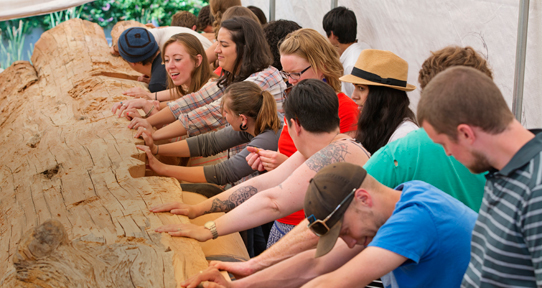
Working in small groups with guidance from Indigenous instructors and community partners, UVic education students learn to make course experiences more meaningful as they discover how to shape welcome posts, canoes, blankets and other Indigenous arts.

In Reuven Gordon's Nanoplasmonics Research Lab, grad students use nano-optical tweezers to explore nanoparticles, viruses and protein dynamics—a field that's about to change the pace of drug discovery for diseases such as cystic fibrosis and cancer.
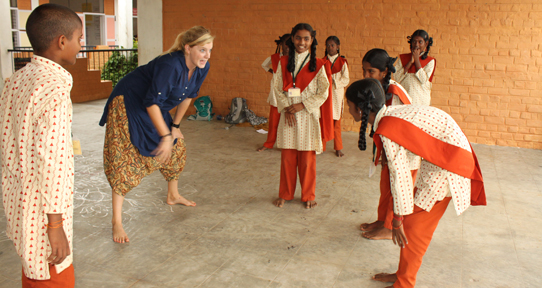
Led by PhD candidate Matthew Gusul, 14 theatre students created a community-building applied theatre program for seniors and youth in India who were displaced by the 2006 tsunami. The team is also training new Indian theatre directors.
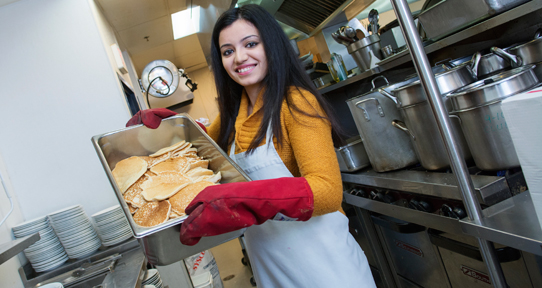
At Our Place, an organization that supports the homeless and the marginally housed, students from the Gustavson School of Business analyzed and recommended improvements for the agency's food services program that serves up to 1,500 meals per day.
The world is interconnected and ever-evolving. We think learning should be too.
At UVic every student is immersed in dynamic learning that’s fuelled by research-inspired insights and personal, hands-on experiences.
Some work with First Nations communities, international village settings, or wilderness protected areas in field schools. Others tackle international innovation challenges or collaborate on groundbreaking research.
When students engage directly in problem-solving, the interplay of ideas and action gives them a powerful edge of career-relevant expertise and personal growth.
Dynamic learning isn’t just about finding answers. It’s also about being inspired by research to ask different questions. What if… we listen to “voices” of proteins to find disease? Reimagine services for the homeless? Use intergenerational theatre to rebuild communities in tsunami-ravaged India?
“What if…” Learning two small words can change everything.
"I kept saying 'I can't believe I'm in class right now,' when we were hiking through a national park, talking to locals in a village, or wandering through a palace. I realized the value of experiential learning opportunities like these. Instead of simply learning about topics, we saw them first-hand and had the opportunity to engage with them."
Geography student Julia Bennett, about the geography department's India Field School.
Experience hands-on learning


Narratives of Memory, Migration, and Xenophobia: A Brief Overview
Students of this field school from University of Victoria visited Hungary, Germany, France and Canada, reflecting on how narratives (both written and musical) of the past inform the present context of migration and xenophobia. Music: "Lemon and Melon" by Blue Dot Sessions From the Free Music Archive CC BY NC UVic's YouTube channel: http://youtube.com/uvic University of Victoria: http://uvic.ca
Ancient village unearthed
A 14,000-year-old village site on Triquet Island that did not freeze over during the last Ice Age was home to Heiltsuk First Nations and reaffirms their oral history of a place their ancestors travelled to for survival. UVic PhD candidate Alisha Gauvreau (anthropology) was part of the team of archaeologists from UVic, the Hakai Institute and local First Nations to unearth the ancient village site. More: https://uvic.ca/news/topics/2017+heiltsuk-alishagauvreau-ancient-village+ring UVic's YouTube channel: http://youtube.com/uvic
Victoria Hand Project
The "Victoria Hand" is a project of the University of Victoria’s Biomedical Design and Systems Laboratory. Led by Dr. Nikolai Dechev, the Victoria Hand Project (VHP) is a not-for-profit that’s designing and distributing low-cost ($350), high-functioning, upper limb 3D-printed prostheses to people in need. Working with organizations which have established relationships on the ground in Guatemala (Range of Motion Project) and Nepal (Kathmandu Orthopaedic Hospital), Joshua Coutts—BEng ’14—is a research associate for ongoing field trials. The Victoria Hand Project: http://www.victoriahandproject.com/ Biomedical Design and Systems Laboratory: http://web.uvic.ca/~bdsl/ UVic's YouTube channel: http://youtube.com/uvic University of Victoria: http://uvic.ca
UVic's Jewish Cemetery Field Course
Anthropology students discuss the unique opportunity to work locally at a Jewish Cemetery helping to document the monuments.
Taking research beneath the waves
Mike Irvine's graduate research at the University of Victoria's Faculty of Education focused on how underwater cameras connect kids to the ocean, motivating students to ask more questions and become more informed about human impacts on the ocean. Irvine says the impact of his research comes from where he’s taking it. To explore how underwater dives and live-streaming technology might revolutionize ocean education globally, he’s brought together UVic ocean scientists, students, dive industry technicians, educators, engineers and tech enthusiasts to co-found the Fish Eye Project, a not-for-profit organization using innovative technology to build ocean awareness. His goal is to motivate kids—big and small—to dig into marine science, to go beneath the waves and maybe be the researchers of the future who will pioneer the next wave of ocean communication. For more info: http://ring.uvic.ca/news/pinstripes-and-flippers-uvic-grad-student-takes-academia-underwater UVic's YouTube channel: http://youtube.com/uvic University of Victoria: http://uvic.caSee more videos from the Dynamic learning at UVic playlist on YouTube.
Co-op: learning beyond the classroom
UVic has one of Canada’s largest university co-operative education programs with more than 3,200 placement each year. Co-op integrates academic studies with relevant paid work experience in more than 40 academic areas.
One in three UVic undergraduates take part in co-op. They combine real-world experience and graduate with a resume packed with relevant experience.
Every year, 100 undergraduates from across campus gain direct research exposure as part of their learning experience through the Jamie Cassels Undergraduate Research Awards (JCURA) program.
By pairing professors with students, the JCURA program provides research opportunities rarely encountered at the undergraduate level.
The program encourages the development of strong academic relationships. It funds collaborative research projects between faculty and undergraduates, giving promising students an appetite for original research in the process.
"The JCURA program is unique in Canada for the depth and breadth of disciplines involved across the full academic spectrum," says Teresa Dawson, past director of the Learning and Teaching Centre, which administers the program.
UVic's Learning without Borders (LWB) initiative supports integrating international elements into our undergraduate curriculum.
The initiative offers up to 10 competitive peer-reviewed grants to design/redesign significant components of undergraduate programs to have an integrated international focus.
The goal is to create a growing community involved in the internationalization of the UVic curriculum who are willing to share their experiences and inspire others through their leadership. Learn about some of the outcomes of these grants.
Students participating in LWB-enhanced courses reported substantial positive changes in global knowledge, taking others’ perspectives and actively seeking out information about other cultures.
At UVic we recognize that the post-secondary teaching market is a competitive one.
That’s why we created the Learning and Teaching in Higher Education (LATHE) program for those preparing for an academic career in higher education.
This two-year graduate credit program is guided by recent research in the psychology of learning and instruction. It’s earned in conjunction with a graduate degree program.
LATHE students build their teaching portfolios and gain practical experience, skills and strategies. They graduate qualified to compete effectively for an academic position with those who share similar teaching experiences.
Field schools provide a transformative learning experience for both students and faculty. These programs are short-term courses offered for credit through the University of Victoria and facilitated by individual faculty members.
Our students wade knee-deep into research at Vancouver Island's Bamfield Marine Sciences Centre—one of the best facilities on the planet for coastal marine research.
The Redfish School of Change is an interactive and experiential field school for students interested in food security, ecological sustainability and social equity.
The hands-on experience of a field school allows you to more fully appreciate the practical side of research and data analysis.
